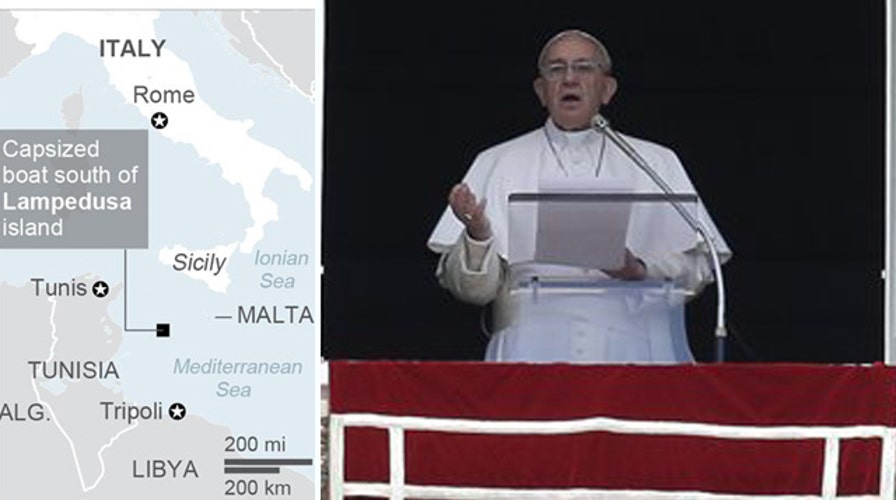Boat capsizes, hundreds of migrants missing in Mediterranean
Pope Francis leads world in prayer for missing people
The smugglers’ boat that capsized off Libya over the weekend held hundreds of migrants in locked holds of the vessel, an Italian prosecutor said Monday.
Salvi told reporters in Sicily, that "a few hundred were forced into the hull and they were locked in and prevented from coming out." He said hundreds more were "closed in" at the second level, while hundreds more were on the upper deck.
Earlier a survivor of Sunday's capsizing of the boat bound for Italy from North Africa told how smugglers locked hundreds of people below deck.
Survivor estimates of the number of people on board varied, with the Italian Coast Guard saying that the capsized boat had a capacity for `'hundreds" of people. Italian prosecutors said a Bangladeshi survivor flown to Sicily for treatment told them 950 people were aboard, including hundreds who had been locked in the hold by smugglers. Earlier, authorities said a survivor told them 700 migrants were on board, but it was not clear if they were referring to the same person.
Officials said the official death toll may never be known.
Britain's Daily Telegraph quoted the Bangladeshi survivor as telling police "There were 40 to 50 children and around 200 women [on board]. When we sailed the traffickers locked the hatches to prevent people getting out."
Prosecutor Giovanni Salvi told The Associated Press by phone from the city of Catania that the survivor told prosecutors that about 300 people were in the hold, but stressed that there was no confirmation yet of the man's account and that the investigation was ongoing.
The survivor's account would jibe with the theory of Gen. Antonino Iraso of the Italian Border Police. In commenting on the small number of survivors and victims pulled from the water, Iraso said that "surely the boat would have sunk" with hundreds of people locked in the hold.
As of Sunday evening, just 28 survivors and 24 bodies had been pulled from the Mediterranean Sea, according to Italian Premier Matteo Renzi. Maltese Prime Minister Joseph Muscat, whose island nation joined the effort, said only 50 survived, and called it the "biggest human tragedy of the last few years."
Iraso said the sea in the area is too deep for divers, suggesting that the final toll may never be known. The sea off Libya runs as deep as 3 miles or more. The Italian Coast Guard told the Telegraph that migrants could survive in the water for some time, due to its moderate temperature.
The 66-foot vessel may have overturned because migrants rushed to one side of the craft late Saturday night when they saw an approaching Portuguese-flagged container ship, the King Jacob, which was sent to the area by Italy's Coast Guard. The ship's crew "immediately deployed rescue boats, gangway, nets and life rings," a spokesman for its owner said.
Asked whether migrants rushed to one side as the Portuguese vessel pulled close, Iraso told Sky TG24 TV that "the dynamics aren't clear. But this is not the first time that has happened."
Renzi praised the container ship for quickly responding on what would become its fifth recent rescue operation.
The tragedy has prompted calls for European nations to develop a unified response to the flood of migrants who make the risky crossing to escape war, poverty, and repression.
"Europe can do more and Europe must do more," said Martin Schulz, president of the European Parliament. "It is a shame and a confession of failure how many countries run away from responsibility and how little money we provide for rescue missions."
Europe must mobilize "more ships, more overflights by aircraft," French President Francois Hollande told French TV Canal + on Sunday. "Words won't do anymore," Spain's Prime Minister, Mariano Rajoy, told a political rally.
Renzi said he too wants action, but he rejected calls by some Italian lawmakers for a naval blockade. That would only "wind up helping the smugglers" since military ships would be there to rescue any migrants, and they wouldn't be able to return passengers to chaos and violence in Libya.
Desperate migrants from Africa, the Middle East and Asia have long tried to reach Europe. Libya has become a more frequent point of departure in the years since rival militias, tribal factions and other political forces destabilized the country following the bloody end of Moammar Gadhafi's dictatorship.
Malta and Italy are closest to the Libyan coast, and have received the brunt of a migrant tide that carried 219,000 people from Africa to Europe last year. Some 3,500 are known to have died along the way, the U.N. High Commissioner for Refugees Antonio Guterres said in a statement Sunday.
The Associated Press contributed to this report.

